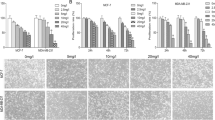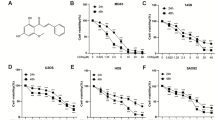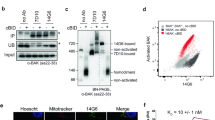Abstract
In a preliminary study, we found that benzyloxycarbonyl-Val-Ala-Asp(OMe)-fluoromethylketone (zVAD- fmk), unlike Boc-aspartyl(OMe)-fluoromethylketone (BocD-fmk), at usual dosage could not prevent genistein-induced apoptosis of p815 mastocytoma cells. This study was undertaken to reveal the mechanism underlying the incapability of zVAD-fmk in preventing this type of apoptosis. We observed that 14-3-3 protein level was reduced in genistein-treated cells and that BocD-fmk but not zVAD-fmk prevented the reduction of 14-3-3 protein level and the release of Bad from 14-3-3. We also demonstrated that truncated Bad to Bcl-xL interaction in genistein- treated cells was prevented by BocD-fmk but not by zVAD-fmk treatment. Our data indicate that BocD- fmk, compared to zVAD-fmk, has a certain preference for inhibiting 14-3-3/Bad signalling pathway. We also elucidated that this differential efficacy of BocD-fmk and zVAD-fmk resulted from the different effect in inhibiting caspase-6 and that co-treatment of zVAD-fmk and caspase-6 specific inhibitor substantially prevented genistein-induced apoptosis. Our data shows that caspase-6 plays a role on Bad/14-3-3 pathway in genistein-induced apoptosis of p815 cells, and that the usual dose of zVAD-fmk, in contrast to BocD-fmk, did not prevent caspase-6 acting on 14-3-3/Bad-mediated event.
Similar content being viewed by others
Article PDF
Author information
Authors and Affiliations
Rights and permissions
This is an Open Access article distributed under the terms of the Creative Commons Attribution Non-Commercial License (http://creativecommons.org/licenses/by-nc/3.0/) which permits unrestricted non-commercial use, distribution, and reproduction in any medium, provided the original work is properly cited.
About this article
Cite this article
Yee, SB., Baek, S., Park, H. et al. zVAD-fmk, unlike BocD-fmk, does not inhibit caspase-6 acting on 14-3-3/Bad pathway in apoptosis of p815 mastocytoma cells. Exp Mol Med 38, 634–642 (2006). https://doi.org/10.1038/emm.2006.75
Published:
Issue date:
DOI: https://doi.org/10.1038/emm.2006.75
Keywords
This article is cited by
-
Caspase-mediated cleavage of actin and tubulin is a common feature and sensitive marker of axonal degeneration in neural development and injury
Acta Neuropathologica Communications (2014)



